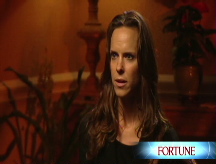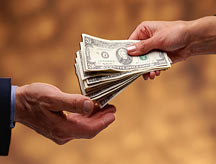Charities see donations drop as need spikes
Major philanthropies expect more unfulfilled pledges in face of recession, but also see uptick in volunteerism.
NEW YORK (CNN) -- Charities are just as vulnerable, if not more so, to economic weakness as are corporations.
"The way the economy goes determines how charity goes," said Melissa Brown, associate director of research at the Center on Philanthropy at Indiana University in Indianapolis.
Total giving figures for last year will not be available until June, but "many charities are reporting lower income from donations," she said.
Surveys of the largest 100 United Ways in December and January suggest a decline of 2% to 5.6% in giving this year.
More than half of the United Ways - 58% - are expecting a drop this year, said Sally Fabens, a spokeswoman for the charity.
In addition, 82% are anticipating higher rates of uncollectible pledges, she said.
Some areas have been hit harder than others. For example, the United Way in Elkhart, Indiana, expects a 50% drop in donations, she said. The city, which was visited Monday by President Barack Obama, has a 15% unemployment rate.
But the nation's economic travails have coincided with an increase in volunteerism, said Fabens, who added that even if the predicted declines prove true, the United Way is still likely to raise more than $4 billion this year.
It will be needed, since demand has spiked, she said - with calls to the United Way's hotline increasing for financial assistance to cover basic needs like food, shelter and clothing.
United Way's biggest drop in donations occurred in 1932, when they fell by 24%, followed by two more years of increasingly smaller declines until 1935, when growth resumed.
The United Way's 1,300 affiliates are led by Brian Gallagher, whose salary was $475,967 in 2007. That salary was ranked 20th by The Chronicle of Philanthropy's Executive Compensation report of charities for 2007, said Fabens.
For some, the downturn may not have hit yet. The Salvation Army, the nation's second-largest charity, does not yet have projections for the year, but last year's Christmas Internet donations were up more than 25%, from $7.9 million to $10.1 million, said Melissa Temme, the organization's public relations director.
"More people are giving, but the size of the donation is going down," she said, noting that the average donation dropped from $225 in 2007 to $190 last year.
Still, more than 93% of fundraisers said the economy is affecting their jobs negatively, "including 28.5% who reported a very negative impact," said Una Osili, interim director of research at the Center on Philanthropy, in a news release. "However, just over 21% of those surveyed expect the economic impact to be positive six months from now."
The Salvation Army's equivalent of a CEO, Commissioner Israel Gaither, had a salary of $108,088, which included housing and food and which he received jointly with his wife, Commissioner Eva Gaither, national president of women's ministries, Temme said.
The organization, which started in London in 1865 and began its U.S. operations in 1882 in New York City, has dealt with bad economic times before. It turned its community centers into homeless shelters during the Great Depression, Temme said. "They got pretty creative," she said, noting that staffers lived and ate with the homeless, got food handouts from restaurants and used orange crates as bassinets.
Such creativity may prove key to charities' survival. Brown of the Center on Philanthropy noted that the Nature Conservancy announced layoffs this week, and a number of religious congregations have laid off staff and cut programming "because the offering plate is thinner than they're used to."
In the last six months of last year, the number of $1 million charitable gifts dropped by a third, she said.
Brown said data from the Giving USA Foundation, whose records go back to 1955, show that educational and religious institutions tend to suffer the most during recessions.
No groups appear to be immune to downturns. During the 16 months of recession that began in 1973 and ended in 1975, "almost every subsector saw a 5% or more drop," she said.
But, she said, though the current malaise is the worst most people alive have ever seen, "Don't expect the world to end either. People do continue to give."
In fact, in any one year, some 70% of Americans give to charity, and they tend to give about 3% of their income, unless they've lost their jobs entirely, Brown said. ![]()



